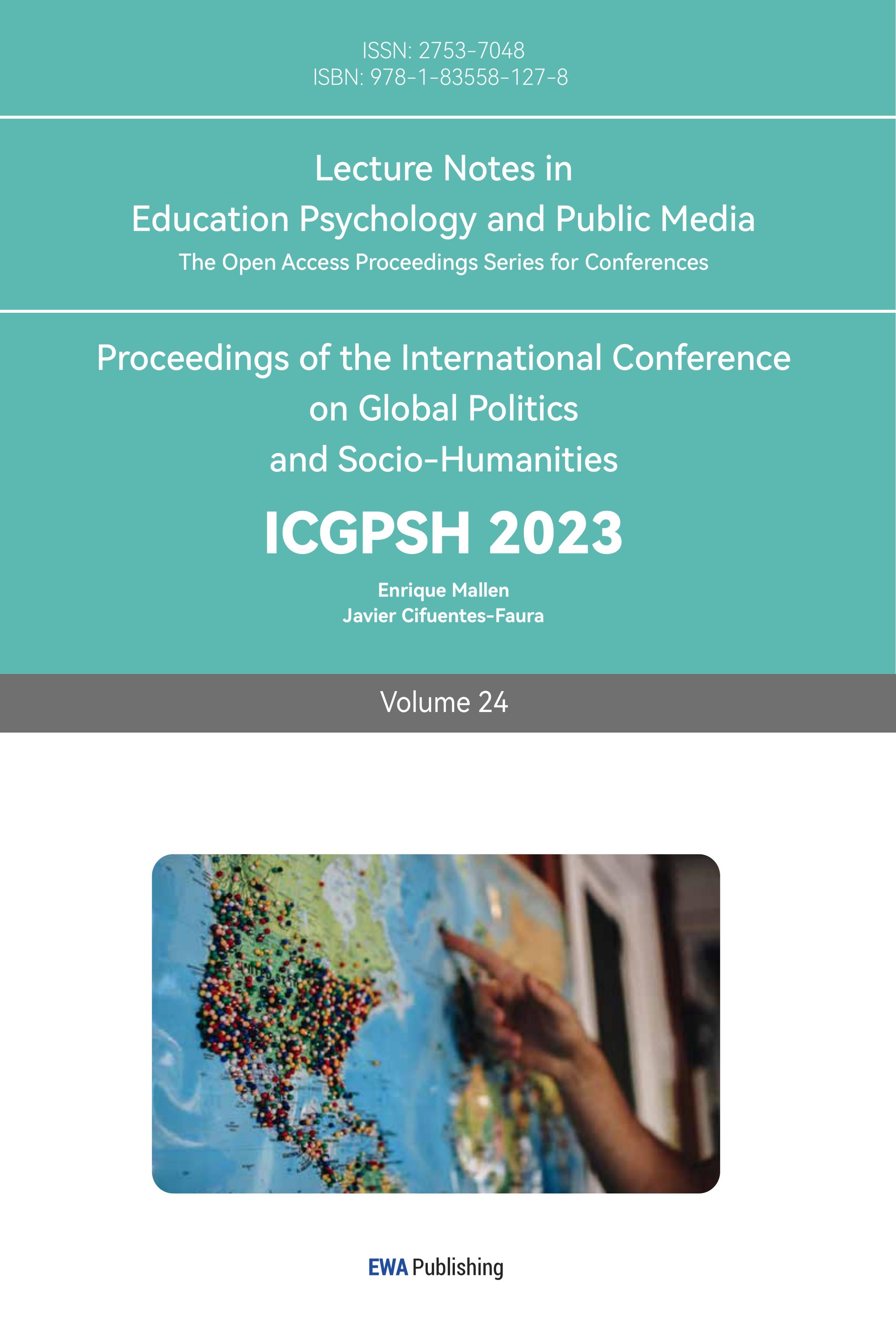References
[1]. Organization for Economic Co-operation and Development. (2015). Income inequality data update and policies impacting income distribution: United Kingdom. Retrieved from https://www.oecd.org/unitedkingdom/OECD-Income-Inequality-UK.pdf
[2]. Hemes G., Knudsen K. (1992). Norwegians’ attitudes toward new immigrants. Acta Sociologica, 35, 123-139.
[3]. Li J. (2015), “Brexit Referendum: Background, Demands and Future Prospects”, Contemporary World, 9, pp. 55-58.
[4]. Pan Xingming (2014). Analysis of the New orientation of British policy towards Europe. Journal of China Foreign Affairs University, 31, 4th edition, 107-120.
[5]. Andrew Marr, translated by Li Yan (2020). Modern British history. Oriental Press, p. 764.
[6]. Guo, J. (2009). Analyzing Welfare Claims in Contemporary British Party Campaigns: Party Competition and Welfare Policies. European Studies, 27(02), 15-31+159.
[7]. Ning, G., & Liu, W. (2006). A Comparative Study of Party Policies and Public Policies from the Perspective of Interest Analysis. Quest, 12, 55-56+226. DOI: 10.16059/j.cnki.cn43-1008/c.2006.12.018.
[8]. Meyer, T., Guo, Y., & Chen, L. (2000). Hot Topics and Cold Reflections (Part Sixteen): Dialogues on Party Politics in the Media Society. Contemporary World and Socialism, 04, 4-13. DOI: 10.16502/j.cnki.11-3404/d.2000.04.001.
[9]. Zhang, L. (2014). A Study of Party Influence in American Presidential Elections. Huazhong Normal University.
[10]. Chai, B. (2009). On the Relationship between Party Identification and Party Leaders. Theoretical Monthly, 05, 65-67.
Cite this article
Huang,H.;Liu,X.;Xu,C. (2023). Research on the Two-way Interaction Between Voters and Political Parties in Elections. Lecture Notes in Education Psychology and Public Media,24,146-150.
Data availability
The datasets used and/or analyzed during the current study will be available from the authors upon reasonable request.
Disclaimer/Publisher's Note
The statements, opinions and data contained in all publications are solely those of the individual author(s) and contributor(s) and not of EWA Publishing and/or the editor(s). EWA Publishing and/or the editor(s) disclaim responsibility for any injury to people or property resulting from any ideas, methods, instructions or products referred to in the content.
About volume
Volume title: Proceedings of the International Conference on Global Politics and Socio-Humanities
© 2024 by the author(s). Licensee EWA Publishing, Oxford, UK. This article is an open access article distributed under the terms and
conditions of the Creative Commons Attribution (CC BY) license. Authors who
publish this series agree to the following terms:
1. Authors retain copyright and grant the series right of first publication with the work simultaneously licensed under a Creative Commons
Attribution License that allows others to share the work with an acknowledgment of the work's authorship and initial publication in this
series.
2. Authors are able to enter into separate, additional contractual arrangements for the non-exclusive distribution of the series's published
version of the work (e.g., post it to an institutional repository or publish it in a book), with an acknowledgment of its initial
publication in this series.
3. Authors are permitted and encouraged to post their work online (e.g., in institutional repositories or on their website) prior to and
during the submission process, as it can lead to productive exchanges, as well as earlier and greater citation of published work (See
Open access policy for details).
References
[1]. Organization for Economic Co-operation and Development. (2015). Income inequality data update and policies impacting income distribution: United Kingdom. Retrieved from https://www.oecd.org/unitedkingdom/OECD-Income-Inequality-UK.pdf
[2]. Hemes G., Knudsen K. (1992). Norwegians’ attitudes toward new immigrants. Acta Sociologica, 35, 123-139.
[3]. Li J. (2015), “Brexit Referendum: Background, Demands and Future Prospects”, Contemporary World, 9, pp. 55-58.
[4]. Pan Xingming (2014). Analysis of the New orientation of British policy towards Europe. Journal of China Foreign Affairs University, 31, 4th edition, 107-120.
[5]. Andrew Marr, translated by Li Yan (2020). Modern British history. Oriental Press, p. 764.
[6]. Guo, J. (2009). Analyzing Welfare Claims in Contemporary British Party Campaigns: Party Competition and Welfare Policies. European Studies, 27(02), 15-31+159.
[7]. Ning, G., & Liu, W. (2006). A Comparative Study of Party Policies and Public Policies from the Perspective of Interest Analysis. Quest, 12, 55-56+226. DOI: 10.16059/j.cnki.cn43-1008/c.2006.12.018.
[8]. Meyer, T., Guo, Y., & Chen, L. (2000). Hot Topics and Cold Reflections (Part Sixteen): Dialogues on Party Politics in the Media Society. Contemporary World and Socialism, 04, 4-13. DOI: 10.16502/j.cnki.11-3404/d.2000.04.001.
[9]. Zhang, L. (2014). A Study of Party Influence in American Presidential Elections. Huazhong Normal University.
[10]. Chai, B. (2009). On the Relationship between Party Identification and Party Leaders. Theoretical Monthly, 05, 65-67.









